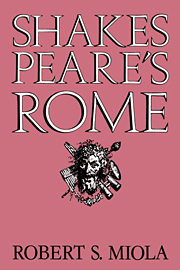Book contents
- Frontmatter
- Contents
- Acknowledgments
- Notes on sources
- I The roads to Rome
- II The Rape of Lucrece: Rome and Romans
- III Titus Andronicus: Rome and the family
- IV Julius Caesar: Rome divided
- V Antony and Cleopatra: Rome and the world
- VI Coriolanus: Rome and the self
- VII Cymbeline: Beyond Rome
- VIII Conclusion
- Index
V - Antony and Cleopatra: Rome and the world
Published online by Cambridge University Press: 28 October 2009
- Frontmatter
- Contents
- Acknowledgments
- Notes on sources
- I The roads to Rome
- II The Rape of Lucrece: Rome and Romans
- III Titus Andronicus: Rome and the family
- IV Julius Caesar: Rome divided
- V Antony and Cleopatra: Rome and the world
- VI Coriolanus: Rome and the self
- VII Cymbeline: Beyond Rome
- VIII Conclusion
- Index
Summary
Shakespeare's next major encounter with Rome, Antony and Cleopatra, is in many ways a sequel to Julius Caesar. Antony's fatal infatuation with Cleopatra commanded as much attention in the Renaissance as did Caesar's assassination. In M. W. MacCallum's words:
Next to the story of Julius Caesar, the story of Antony and Cleopatra was perhaps the prerogative Roman theme among the dramatists of the sixteenth century and was associated with such illustrious personages as Jodelle and Garnier in France, and the Countess of Pembroke and Daniel in England.
In addition to the popularity of subject matter, the two plays share a focus on the same critical juncture in Roman history: the decades encompassing the dissolution of Republic and the birth of Empire. Both plays derive from Plutarch's Lives; both freely incorporate material from other writers, notably Appian and Vergil; both express Shakespeare's increasingly critical conception of Rome and Roman values. Like Julius Caesar and Shakespeare's other Roman works, Antony and Cleopatra examines the struggle of Romans with Rome, portrayed as a physical locality and an imagined ideal. The play explores the resulting conflict between private needs and public responsibilities by again focusing on the Roman code of honor, shame, and fame; the paradoxes implicit in Roman ceremony and ritual; the political motifs of rebellion and invasion. As do Shakespeare's previous Roman works, Antony and Cleopatra explores the predicament of the living human beings who must define themselves against the oppressive background of Roman tradition and history.
- Type
- Chapter
- Information
- Shakespeare's Rome , pp. 116 - 163Publisher: Cambridge University PressPrint publication year: 1983



